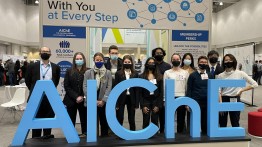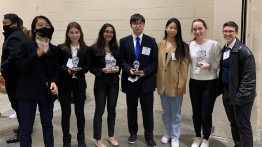Chemical Engineering Students Receive Awards and Faculty Present at the 2021 AIChE Annual Meeting and Student Conference
POSTED ON: December 3, 2021
In early November, chemical engineering students, faculty, and alumni attended the 2021 AIChE Annual Meeting and Student Conference in Boston, Massachusetts. AIChE is the world’s leading organization for chemical engineering professionals, with over 60,000 members from more than 110 countries.
At the conference, students participated in workshops, panels, and the undergraduate research poster competition. This year, multiple students took home awards from the undergraduate poster competition thanks to the mentorship provided by the chemical engineering faculty and the support provided by Chemistry and Chemical Engineering Lab Technicians, Revans Ragbir and Christian Carter.
The student awards received from the Undergraduate Research Poster Competition include:
- Renata Ashapatov ChE’23 (with co-authors Seemee Seon ChE’22 and Sanjna Rao ChE’22) placed 1st in the Environmental Division III
- Caitlin Noonan ChE’24 (with co-authors Naomi Akiyama ChE’23, Canying Wang ChE’23, and Xiao Lin ChE’23) placed 2nd in the Environmental Division III
- Xiao Lin ChE’23 (with co-author Aviv Kresch ChE’23) placed 3rd in the Environmental Division III
- Sanjna Rao ChE’22 placed 3rd in the Material Science Division VIII
In addition to the student awards, all chemical engineering faculty members were associated with papers and presentations given throughout the meeting. Professor Benjamin Davis (Chair of the AIChE Education Division) presented on “Designing a Sars-Cov-2 Vaccine Facility” and “Developing a Cross-Disciplinary Sustainability and Alternative Energy Course,” with contributions by Professor Ogbonnaya Okorafor, Assistant Professor Amanda Simson, and Assistant Professor Jennifer Weiser.
Professor Weiser’s research on biomaterials, hydrogels, and operating rooms, and Professor Simson’s research on biochar were presented in multiple papers, presentations, and posters. Professor Daniel Lepek, who was recently elected as the next Chair of the AIChE Education Division, served as a Program Chair for the meeting. He presented on the AIChE Education Division’s Virtual Communities of Practice initiative and organized and moderated an invited industry-academia panel titled, “Mind the Gap: Industrial Perspectives on Educating Chemical Engineers.”
Additional students and alumni who either attended or were represented at the conference include: Edward Bukhman ChE’23, Christopher Panebianco ChE’16, Keti Vaso ChE’19 ChE ME ’21, Kevin Chen ChE’19 ChE ME’21, and Mahir Alam ChE ’19.
We gratefully acknowledge the generous contributions of Alan Fortier ChE’79 in support of the Chemical Professional Development Award Fund, which supported the participation of students at the event. Student researchers were also supported by the Henry C. Enders Scholarship and by a generous grant to support bioengineering research from a foundation that wishes to remain anonymous.






